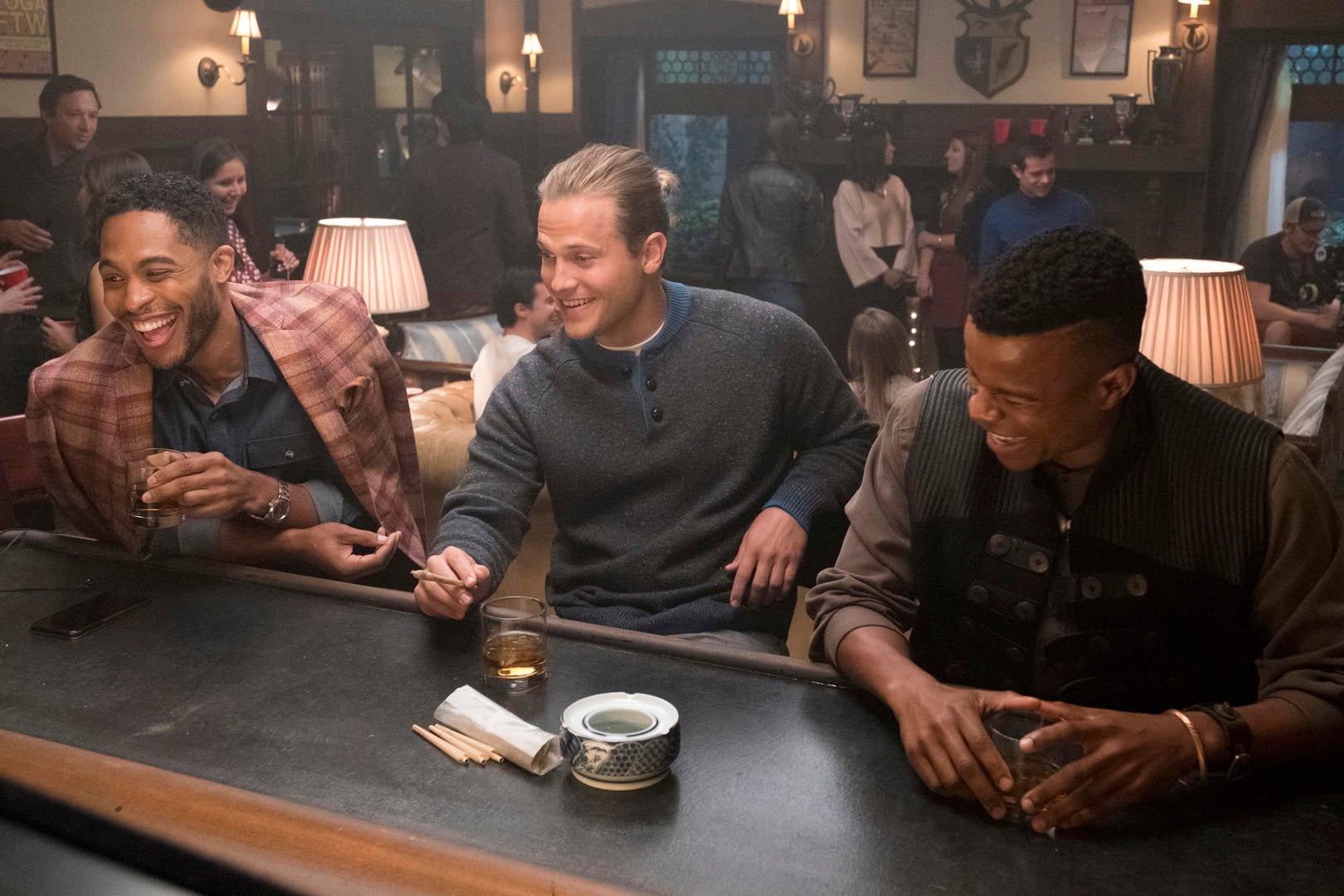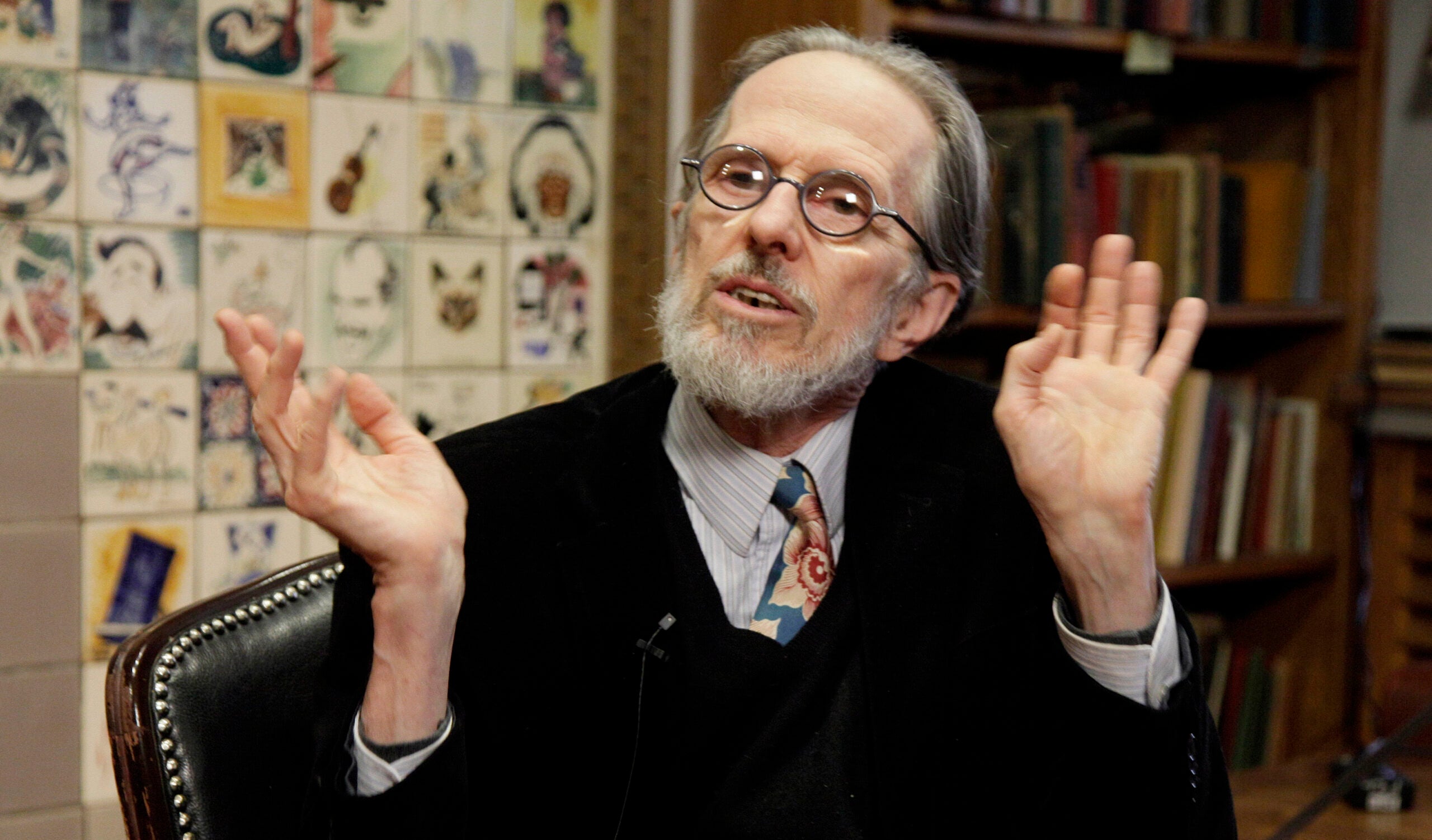Stand-up comedian Laurie Kilmartin talks about how the loss of her father inspired her to find the funny side of death. Justin Simien talks about his ambitious, provocative and funny Netflix series, “Dear White People”; and just when you thought it was safe to to take a shower again, we revisit one of the most famous scenes in cinema history — the shower scene from Alfred Hitchcock’s 1960 shocker, “Psycho.”
Featured in this Show
-
Laurie Kilmartin Uses Humor To Cope With Her Father's Death
Laurie Kilmartin is a stand-up comedian and a writer for Conan O’Brien’s late-night TV talk show, “Conan.” After her father died of lung cancer in 2014, she channeled her grief into a comedy special called “45 Jokes About My Dead Dad.”
Since, Kilmartin has written an honest and irreverent guide to dealing with death and dying. It’s called “Dead People Suck: A Guide for Survivors of the Newly Departed.”
On the morning of Sunday, March 2, Kilmartin’s father, Ron Kilmartin, died of lung cancer at the age of 82. The day before his death, Kilmartin says her father had a difficult night, and her and her sister were there trying to help.
“My Dad was not the type to tell you if he was in pain but as far as I could tell, that was really the night that was really difficult for him in terms of breathing and just getting enough air,” she told WPR’s “BETA.” “… (We) told him all the great things he did for us, and how much fun he was, and how many great memories of him, while we were trying to help him breathe. I guess the breathing got easier because then he sort of, he needed to lay down and he fell asleep.”
When she woke up the next morning, Kilmartin noticed her father’s breathing was changing.
“His breaths were 15 seconds apart, then 20 seconds apart, and I guess I should have known that was it but I didn’t. I just thought he was really relaxed. I was like, ‘Oh, thank God.’ And then, you know, at one point, there was no new breath.”
Kilmartin, her sister and her mother spent the rest of the day with her late father, not ready to call the mortuary to come and take her father away because they couldn’t believe he was dead. Instead, the three got into the hospital bed with her father and watched the Oscars.
“We watched the Oscars with him and it was kind of this weird, wonderful night,” Kilmartin said.
It was inevitable that Kilmartin would take a sad subject like the death of a parent and turn it into comedy.
“When my dad was dying, I didn’t want to do any stand-up shows because I didn’t want to leave the house because what if I missed him when he died? So I just started tweeting a bunch of jokes that I probably would have tried at just a show that night in the Bay Area. And that became sort of how I coped with it.”
In her book, Kilmartin writes a special note to her father:
“I can’t wait to see you again, I have so much to tell you.”
Does this mean that she will see her dad again?
“I do believe the people that have the near-death experiences, they say they talk and they see their loved ones and stuff. So maybe even if it’s those five minutes before I end, my consciousness ends, maybe my brain is going to flood me with memories to make it easier. Or it’s real, those are real things. But I look forward to those few moments where I get to see my dad again and talk. You know, I’d love to hug my dad again but you can’t do that if you’re just a soul. But maybe it’ll feel like a hug.”
-
Netflix's 'Dear White People' Pits Identity Against Self
With the background blurred, a white woman with a high ponytail and unapologetic smile is pulled into focus.
“Wait, what are you?” she voices into the camera, her head bobbing before the camera changes angles to show the cross expression of her cornered victim, a biracial college student and host of a podcast called “Dear White People.”
And while that protagonist is ready with a cutting quip to such a shameless question, she might stumble more over the question of who she is — something that gets more at the crux of the show co-directed and written by Justin Simien.
As students wade through tides of self-discovery that notoriously afflict college-goers, the main characters in the 10-episode second season of “Dear White People” released April 28 on Netflix have a whole other reality to deal with at their fictional Ivy League school, Winchester University — being black when most students are white.

Justin Simien, writer and co-director of “Dear White People.” Matt Sayles/AP Photo“They’re sort of trying to figure out who they are, what their identities mean in a world within a narrative that didn’t necessary have them in mind to begin with,” Simien said.
The series amalgamates the brooding collision of self-identity and race with characters such as the fiery Samantha White (Tessa Thompson), named intentionally for the dissonance she endures as the daughter of a white man and who wears the incessant reminder of her black heritage on her light-brown skin.
One of the first voices in Simien’s head when conceiving “Dear White People,” White is a composite of Simien’s own mother and a more outspoken version of himself. White reflects the tug-of-war between being white or being black, leaving her to question if she has to choose a side. And if so, which one?
Each episode in the second season, save for the last, focuses on the experiences of one character, nose-diving viewers into the realities and trepidations of what it means to be black, or not black, or not black enough.
“That’s really one of the joys of being a filmmaker or storyteller of color is that I have the opportunity to bring so many perspectives and stories to the culture that just sort of systemically have been locked out,” he said.
“Dear White People” picks up where a movie by the same name left off, with White creating a stir as the host of a podcast that has been criticized as racist, Simien said.
The series opens with White pasted into the background of a blackface party, taking in the scenes on her video camera of people pretending to be black. The party is explained by the “ethnic but non-threatening voice” of narrator and actor Giancarlo Esposito.
This all starts because “Pastiche,” a satire magazine on campus, launches an attack against White in the form of a blackface party as a way to keep “with its vow to mock anyone deemed too self-important.”
The party was supposed to be canceled, but news of it got out anyway.
Simien said White’s unsolicited candor at calling out racism on campus could be a personal effort to answer her own questions about her racial identity.
“I think that sort of what she is grappling with is how much of this is me and how much of this am I just in reaction to something?” Simien said.
But being black slows the process of unmasking her true identity, Simien said.
“For black folks, because our identities are so much in response to how people see us, it honestly takes us a lot longer in life to really figure out who we are and what we really care about and what we really want,” Simien said.
There’s a levity — a certain light-skinned privilege — paired with not being framed constantly in the context of skin color. Coco Conners (Antoinette Robertson) reveals that when she tells White in the first season that she can get away with murder because she looks whiter than her black cohost.
“Colorism is so rampant in the black community,” Simien said. “That’s a symptom of a world in which the lighter you are, the more accepted and successful you are.”
Those racial biases that know no bounds are scaled down and superimposed on the microcosm that is Winchester University.
“Ultimately, we are talking about America,” Simien said. “We are talking about what it feels like to be something other than what the culture that you have to embrace in order to be ambitious and survive and thrive, how do you figure out who you are and explain to people who you are when there’s literally nowhere else in the culture where that’s being reflected.”
A still frame captured from Netflix’s show, “Dear White People.” Photo courtesy of NetflixAlthough Simien recognizes that the show quantifies this problem through blackness, he thinks it’s a systemic result of the human condition.
“We all go to work and put on a version of ourselves and have to reconcile at some point with who we really are when that version is gone or when we lose the job or when we get caught in a lie or whatever it may be,” he said.
While carefully peeling back some of the struggles cataloged by African-Americans, Simien also has taken careful steps to be accurate about the realities of college life.
He isn’t interested in faking it, and he has a force of intellectuals to back him up. Worried, for example, that Simien’s version of White might be too masculine, he enlisted the help of women to accurately portray a woman’s reality with White and Conners.
“I just thought it would be irresponsible and arrogant to assume that I could speak to that experience as a man,” he said.
Despite the seriousness of the show’s content, comedy is also a big part of it, and that’s intentional. Drama is a gut thing, Simien said. Comedy takes some intellect because it forces you to think about the concept before laughing at it.
“I wanted you to think about these issues just as much as I wanted you to feel about them,” he said.
“It’s an intellectual exercise,” he said. “You actually have something that you can chew on after the show after the episode or the film is over besides just how you feel. Ultimately these are things that I want people to talk about, not just feel their way through.”
Simien isn’t apologetic about the title of the series and the film, despite its shock value.
“At the end of the day, why I stand by the title is because being black is about having you always feel as if you’re in response to a white dominated culture,” he said.
Apparently others agree. In a facetious response to the backlash against the title of the series, Chrome has launched an extension called “Dear White People Word Replacer,” which replaces the word “white” with the word “all.”
An explanation of the extension reads, “Did Dear White People’ offend you when you first heard the title of the Neflix original series? Have you ever called someone a ‘snowflake’ or a ‘SJW,’ when in actuality, you yourself might be the one that’s easily offended?” It goes on to say, “No longer will you have to feel victimized or singled-out, and can enjoy your online experience with a false sense of inclusion.”
-
Filmmaker Alexandre O. Philippe Says Hitchcock’s Famous Shower Scene Turns Us All Into Psychos
Imagine going to see Alfred Hitchcock’s “Psycho” when the movie was originally released in 1960.
You settle into your seat and watch a real estate secretary named Marion Crane (portrayed by Janet Leigh) steal $40,000 from her boss and take a trip to reunite with her debt-ridden boyfriend Sam Loomis so they can start a new life together.
On the way, she spends a night at the Bates Motel. She eats a sandwich in the parlor with the motel’s owner, Norman Bates. Marion returns to her room and has a change of heart about keeping the money. She resolves to go back to Phoenix the next day to return the money to her boss.
But before she turns in for the night, she decides to take a shower, and is viciously stabbed to death in the process.
That’s the moment cinema history changes forever.
Since when is such a violent murder shown in such a fast-paced, kaleidoscopic and kinetic way, accompanied by stabbing, shrieking violins that echo the protagonist’s screams? And since when is the main character of a movie killed off only 47 minutes into a film that runs 109 minutes?
Hitchcock broke all the rules in “Psycho” and made film history in the process.
Alexandre O. Philippe is the director of the documentary, “78/52: Hitchcock’s Shower Scene.” The title is a reference to the fact that the shower scene required 78 different camera setups and consists of 52 cuts.
“It was a new sort of cinematic language,” Philippe told WPR’s “BETA.” “But if you look at the murder itself, you have a number of shots that are from the point of view of the victim. So you’re literally being assaulted. You have a number of shots where you’re the murderer, you’re assaulting Janet Leigh or Marli Renfro (Leigh’s body double) … There are moments where you are the voyeur, moments where you are the spectator, moments where you are literally sort of a removed, almost the eye of God.”
Zeroing in on the camera angles, Philippe mentions a low-angle shot looking up at a silhouette of Norman’s mother.
“What is this? Is this Hitchcock inserting himself into the narrative?” he asked. “What he’s doing in 45 seconds, he literally splits your personality. He turns you into all of these different people at the same time. He turns you into the psycho.”
Composer Bernard Herrmann had to talk Hitchcock into adding music to the shower scene. As Philippe explained, “When (editor George) Tomasini actually screened the shower scene for the first time for Hitchcock without music, it just didn’t work. (Hitchcock) wasn’t happy and at that point, he was actually so disappointed, he was strongly considering cutting the film down to an hour and making it part of his TV show, ‘Alfred Hitchcock Presents,’ which would have been a tragedy.”
Without Herrmann’s powers of persuasion, “Psycho” would not have had the major influence that it has had on cinema. It inspired the slasher film genre and three sequels have been produced.
In 1998, Gus Van Sant made his own cover version of the film which was basically a shot-for-shot remake that starred Vince Vaughn as Norman Bates. More recently, A&E aired the TV series, “Bates Motel,” a contemporary prequel to what is now considered one of the greatest films of all time.
“I haven’t reached the bottom of it,” Philippe said. “I don’t think you can reach the bottom of that shower scene. I think every time you watch it, there’s something new. There are new reflections, there are new ideas, there are new things that I want to explore. So I’m not done with it. And certainly not done with Hitchcock for, hopefully, the rest of my life.”
Episode Credits
- Doug Gordon Host
- Adam Friedrich Producer
- Doug Gordon Producer
- Steve Gotcher Technical Director
- Laurie Kilmartin Guest
- Justin Simien Guest
- Alexandre O. Philippe Guest
Wisconsin Public Radio, © Copyright 2026, Board of Regents of the University of Wisconsin System and Wisconsin Educational Communications Board.



